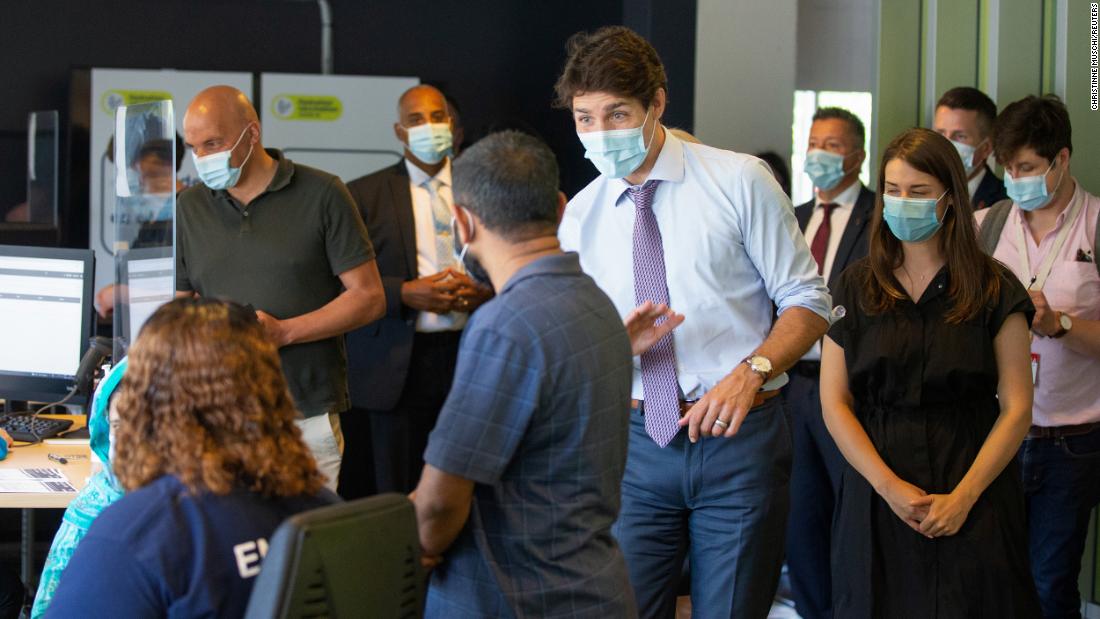According to Health Canada, nearly 70% of Canadians have received at least one dose of the vaccine, putting the country very close to the 75% threshold that public health authorities say is needed to approach herd immunity.
Millions of Canadians were still in lockdown in early spring as they watched their American neighbors get vaccinated and begin a return to more normal life.
But now, the United States has fallen behind. In the US, less than half of the population — 48.6%, per the latest data from the US Centers for Disease Control and Prevention — is fully vaccinated.
“We’ve seen record levels of vaccination, Canada is leading the world in terms of first doses and we’ve just passed the Americans in terms of fully vaccinated Canadians,” Canadian Prime Minister Justin Trudeau said Monday during an infrastructure announcement outside of Toronto.
“We’re going to continue to move forward in a thoughtful and responsible way but the fact is people need to continue to get vaccinated with their second doses and those who’ve been hesitant need to get their first doses.”
But the milestone wasn’t met with a national celebration, as public health officials and politicians continue to urge people to remain cautious.
Canada’s punishing third wave of Covid-19 burdened hospitals this spring and exhausted frontline healthcare workers. It is still a vivid memory for many, even though the country has averaged about 400 cases per day for the last week, according to Public Health Agency Canada.
And vaccine scarcity, until recently, left millions of Canadians feeling anxious and exposed.
“Like people said in March, it was like the ‘Hunger Games’ (for vaccines), hospital systems were crashing, and the supply wasn’t there,” Andrew Young, founder of grassroots organization Vaccine Hunters Canada, told CNN. “Right now, I can tell you I’m a lot more relaxed.”
Young founded the organization in March to help to find vaccines for Canadians as the scramble to get vaccinated was well underway.
Vaccine Hunters Canada said it uses the IT and social media skills of about 100 volunteers to connect Canadians with vaccines.
“I think our real niche was hope, if I could put it that way,” Young said. “There wasn’t much hope in terms of the constant lockdowns, increase in cases, closed down schools. So to me Vaccine Hunters represented hope and the niche that it filled is that it connected all the provinces with its rollout strategies so we had a consolidated platform for Canadians nationwide.”
While the federal government procured and paid for vaccine doses, administering the vaccines was done by individual provinces and territories.
One night a few weeks ago, Young recalled, a vaccine clinic in a Toronto suburb reached out to the organization at 1 a.m. to tell them there were a few dozen vaccine doses leftover.
Vaccine Hunters Canada put the word out on social media and every dose was administered late into the night.
“I still see us as pretty important in terms of helping get the word out, helping amplify the voices of certain groups who needs a little boost,” said Young, adding that the “last percentage” will need more creative strategies as Canada confronts its own vaccine hesitancy.
While Canada says it has procured more doses per capita than most countries around the world, the bulk of doses were not delivered until later in Spring.
Canada still has no significant vaccine manufacturing capacity, although the Trudeau government has promised to fund more domestic vaccine production by 2022.
Canada preparing to reopen its borders to vaccinated Americans
Vaccine uptake was not politicized in Canada.
However, Canada’s Chief Public Health Officer Dr. Theresa Tam has been warning for weeks that vaccine hesitancy could keep Canada from achieving the herd immunity it needs to fight the virus.
In a recent statement, she encouraged Canadians to share “credible” Covid-19 information. She warned earlier this month that not enough younger Canadians were “offering their arms” for vaccinations.
Still, Canada is now confident enough to open it borders to visitors for the first time in 16 months.
Beginning August 9, fully vaccinated citizens and permanent residents of the United States and only those currently residing in the US, will be permitted to enter Canada. Non-essential travel into Canada has been banned since March 2020, something the Canadian government said was necessary to mitigate the spread of Covid-19.
International travelers may also be allowed to enter Canada beginning September 7th, provided that the “Covid-19 epidemiology remains favorable,” the Canadian government said in statement released Monday.
Entry to Canada will continue to be prohibited for all foreign travelers who are not fully vaccinated.
This article was originally published by Cnn.com. Read the original article here.
